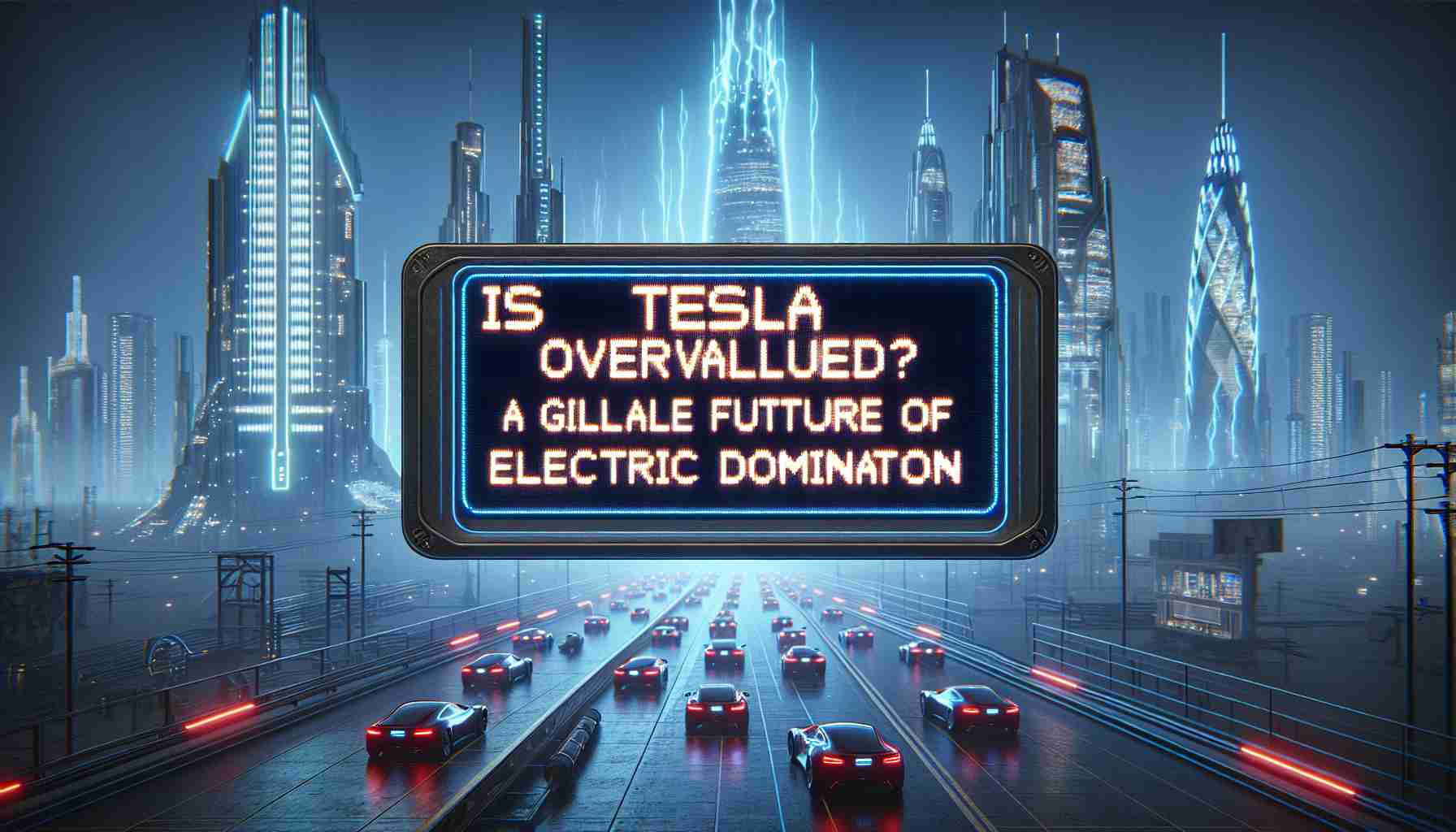In the electric car realm, Tesla has been a trailblazer, revolutionizing personal transportation and challenging century-old automotive norms. The transformation has catapulted Tesla into the limelight as one of the most talked-about companies in the world. But as the value of Tesla surges, industry experts are questioning the volatility and potential growth of this technological juggernaut.
Tesla’s market valuation often exceeds that of traditional automobile giants, leaving skeptics pondering whether its worth is aligned with fundamental performance. While production numbers are climbing and innovative advances, such as autonomous driving capabilities, are materializing, there are signs that other automakers are catching up. Companies like Ford, General Motors, and up-and-coming Chinese manufacturers, are ramping up their electric vehicle lines, potentially cutting into Tesla’s market share.
Moreover, the future landscape of Tesla could mirror the tech sector’s infamous boom-and-bust cycle. With high expectations placed on Tesla’s expansion into energy solutions and artificial intelligence, any misstep could lead to market devaluation. These developments spur an important discussion: Is Tesla’s skyrocketing value a reflection of a nebulous future or a tangible, revolutionary shift in global transportation?
Ultimately, Tesla’s value may hinge on its ability to maintain technological superiority and market dominance. As the electric vehicle landscape continues to evolve, investors and enthusiasts alike should keep a close watch on whether Tesla can sustain its lead in an increasingly competitive market.
The Environmental Impact and Future of Tesla’s Electric Vehicle Revolution
Tesla’s unprecedented rise has not only reshaped the automotive industry but has also had profound implications on the global environment, economy, and the future of humanity. As Tesla and other electric vehicle manufacturers gain traction, the potential for environmental transformation is significant, offering both opportunity and challenge.
Environmental Implications: At the forefront of Tesla’s impact is its potential to reduce the global carbon footprint. The shift from internal combustion engines to electric vehicles promises a dramatic reduction in greenhouse gas emissions, which account for a substantial portion of global pollution. By championing electric cars, Tesla has encouraged a broader transition towards sustainable energy sources, potentially mitigating the effects of climate change. Charging these vehicles with renewable energy from solar panels or wind farms further amplifies this benefit, contributing to a cleaner environment.
Economic Shifts: Tesla’s dominance in the market also reflects a broader economic shift. Traditional auto manufacturers are compelled to innovate, investing heavily in electric vehicle technology and infrastructure. This competition drives job creation in new sectors, from research and development to battery production, helping to boost economies that are quick to adapt. However, there is also a risk of job displacement, particularly in industries linked to fossil fuels.
Future of Humanity: Looking ahead, Tesla’s advances—and the automotive industry’s response—could catalyze a significant change in how humans interact with technology and the environment. The integration of autonomous driving technologies has the potential to revolutionize urban planning and reduce accidents, leading to safer and more efficient transportation systems. As the global fleet becomes increasingly electric, cities may experience reduced air pollution and congestion, allowing for healthier living conditions and more sustainable urban growth.
Global Impact: On a global scale, this transition aligns with international climate goals and could set a precedent for technological innovation and environmental responsibility. If Tesla and its competitors can navigate the challenges of scalability, battery production, and infrastructure development, the automotive industry may serve as a blueprint for other sectors pursuing decarbonization.
In conclusion, Tesla’s impact extends far beyond the automotive field, affecting environmental sustainability, economic models, and the future trajectory of human society. The company’s ability to lead or adapt in this rapidly evolving landscape will be pivotal not only to its own success but also to the broader mission of achieving a more sustainable world. As the market for electric vehicles expands, the potential for long-term positive effects on the environment and society increases, offering hope for a cleaner, greener future.
Is Tesla Still Leading the Charge in a Rapidly Evolving EV Market?
In the fast-paced world of electric vehicles (EVs), Tesla’s early dominance is being tested as new players enter the market with innovative offerings. The electric car giant is facing increasing competition from both traditional automakers and fresh entrants, prompting industry observers to scrutinize its strategies for maintaining market leadership.
New Innovations and Features
Tesla’s commitment to innovation is undisputed, but the competition is heating up. Companies like Ford and General Motors are investing heavily in EV technology, with Ford introducing its Mustang Mach-E and GM prioritizing an electrified future with its Ultium platform. Notably, Chinese companies like NIO and BYD are also making significant strides, with offerings that boast competitive ranges and fast-charging capabilities.
Market Dynamics and Comparisons
The EV market is seeing a shift in consumer preferences, fueled by an increasing awareness of sustainability and regulatory pushes for greener vehicles. Comparisons between Tesla and its competitors now often highlight factors such as battery technology, software, brand loyalty, and network charging infrastructure. Tesla’s Supercharger network remains a competitive advantage, but rivals are rapidly expanding their charging networks as well.
Predictions and Trends
Analysts predict that by 2030, electric vehicles could comprise over half of all new car sales globally. In this evolving landscape, Tesla’s ability to innovate beyond vehicles into energy solutions and integrate features like artificial intelligence will be crucial. As the industry moves toward automation and connectivity, Tesla’s AI capabilities could serve as a catalyst for maintaining its edge.
Security Aspects
With smart technology becoming integral to EVs, security concerns have come to the forefront. Tesla’s vehicles are equipped with advanced cybersecurity measures to protect against threats. However, as cars become more connected, the challenge of ensuring data security and vehicle software integrity intensifies. Companies must invest in robust cybersecurity frameworks to safeguard consumer data and vehicle functionality.
Sustainability Efforts
Tesla continues to advocate for environmental responsibility, with its Gigafactories aiming for reduced carbon footprints. However, sustainable production and battery recycling are areas receiving increased attention from both Tesla and its competitors. Collaborations across the industry are expected to drive significant advancements in eco-friendly manufacturing techniques.
A Competitive Edge or a Fading Advantage?
Ultimately, Tesla’s future might depend less on its current market valuation and more on its ability to innovate beyond traditional automotive paradigms. The company’s success will be measured by its adaptability in a sector characterized by rapid change and fierce competition.
For more insights into evolving automotive technologies, visit Tesla’s official website.


















